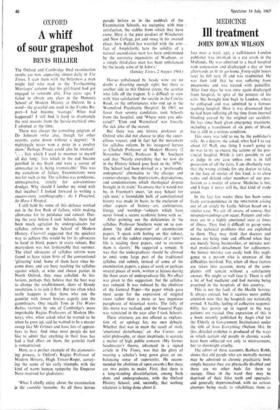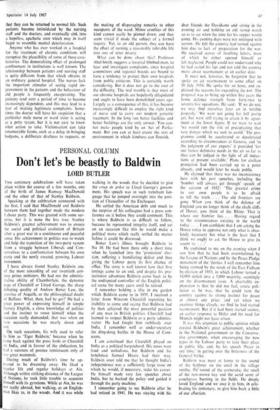Ill treatment
MEDICINE JOHN ROWAN WILSON
Just over a week ago, a well-known London publisher was involved in a car crash in the Midlands. He was admitted to a local hospital with concussion and discharged a day or two afterwards as fit to go. home. Forty-eight hours later he felt very ill and was readmitted. He was then told that he was suffering from pneumonia and was treated with penicillin. After four days he was once again discharged from hospital, in spite of the protests of his wife. She brought him back to London, where he collapsed and was admitted to a famous teaching hospital. Here it was discovered that he had been suffering all the time from internal bleeding caused by the original car accident. He has since been given emergency treatment, including a transfusion of six pints of blood, but is still in a serious condition.
This story was told to me by the publisher's wife. As a doctor, she asked, what had I to say about it? Well, one thing I wasn't going to do was to try to excuse the actions of the pro- vincial hospital. While it isn't possible to act as judge in any case unless one is in full possession of all the facts. I am absolutely sure that the wrong attitude for any doctor to take, in the face of stories of this kind, is to close ranks and defend other members of our pro- fession as a matter of course. Medicine is not, and I hope it never will be, that kind of trade union.
In the last few weeks there has been some lively correspondence in the SPECTATOR arising out of an article by Leslie Adrian based on a similar case. We are all aware, of course, that misunderstandings can occur. Patients and rela- tives are in a highly emotional state at times of illness. They find it difficult to grasp some of the technical problems -that are explained to them. They may think that doctors and nurses are being rude and offhand when (hey are merely being businesslike, or mistake nor- mal professional detachment for callousness. An honest mistake can easily look like negli- gence to a person who is unaware of the difficulties involved. Yet, when all these factors' are taken into account, many of the com- plaints still remain without a satisfactdry answer. We might as well face it. There is still a lot of bad medicine and bad nursing being practised in the hospitals of this country.
This is not the fault of the Health Service. It always existed, but it receives more public attention now that the hospitals are nationally owned. A healthy feeling of collective responsi- bility has grown up in regard to the way patients are treated. One expression of this is a book recently published by Aegis (Aid for the Elderly in Government Institutions) under the title of Sans Everything (Nelson 18s). In this, detailed evidence is produced of the ways in which certain old people in chronic wards have been subjected not only to mistreatment, but to downright cruelty.
The editor of these accounts, Barbara Robb, shows that old people who are mentally normal may be admitted to chronic psychiatric beds simply because they are physically disabled and there are no other beds for them to occupy. Once in the ward they may be deprived of their false teeth and spectacles and generally depersonalised, with no serious attempts being made to rehabilitate them so that they can be returned to normal life. Such patients become intimidated by the nursing staff and the doctors, and eventually sink into a hopeless, apathetic state which may in itself begin to resemble mental deterioration.
Anyone who has ever worked in a hospital for the treatment of chronic conditions will recognise the plausibility of some of these case- histories. The demoralising effect of prolonged confinement in institutions is well known. The relationship between patients and nursing staff is quite different from that which obtains in an ordinary general hospital. The nurses lack the important stimulus of seeing rapid im- provement in the patients and the behaviour of old people is frequently exasperating. The patients tend over a period of time to become increasingly dependent, and this may lead to a fear of making legitimate complaints. Some- times the doctor will have his suspicion that a particular male nurse or ward sister is acting as a petty tyrant, but it is not easy to know what action to take. Victimisation can take innumerable forms, such as a delay in bringing bedpans, a deliberate deafness to requests, or the making of disparaging remarks to other occupants of the ward. Minor cruelties of this kind cannot easily be pinned down, and they seem trivial if made the subject of a formal inquiry. Yet, to an old person, they can have the effect of turning a reasonably tolerable life into one of utter misery.
What can be done about this? Professor Abel-Smith suggests a hospital Ombudsman, to hear and investigate complaints, since hospital committees and regional boards are bound to have a tendency to protect their own hospitals from public criticism. This is certainly worth considering. But it does not go to the root of the difficulty. The real trouble is that most of our chronic hospitals are hopelessly dilapidated and ought to have been demolished years ago. Largely as a consequence of this, it has become increasingly difficult to employ the right kind of nurse and to carry out modern geriatriC treatment. In the long run better facilities and better buildings are the only answer. You can- not make people kind by an Act of Parlia- ment. But you can at least create the sort of environment in which kindness can flourish.































 Previous page
Previous page